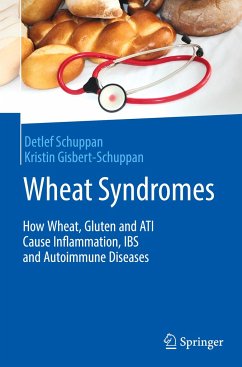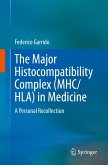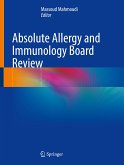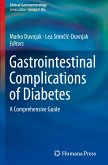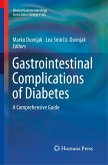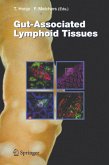Detlef Schuppan, Kristin Gisbert-Schuppan
Wheat Syndromes
How Wheat, Gluten and ATI Cause Inflammation, IBS and Autoimmune Diseases
Detlef Schuppan, Kristin Gisbert-Schuppan
Wheat Syndromes
How Wheat, Gluten and ATI Cause Inflammation, IBS and Autoimmune Diseases
- Gebundenes Buch
- Merkliste
- Auf die Merkliste
- Bewerten Bewerten
- Teilen
- Produkt teilen
- Produkterinnerung
- Produkterinnerung
This book is about three inflammatory conditions that underlie wheat sensitivities caused by the consumption of wheat and related cereals. The book describes, discusses and differentiates celiac disease, amylase trypsin inhibitor (ATI) sensitivity, and the wide spectrum of wheat allergies, especially a novel, but highly common atypical wheat allergy.
The mechanisms of the three wheat sensitivities along with their clinical characteristics, and their their state-of-the art diagnosis and therapy are thoroughly described. This is accompanied by commented case reports. The book is well…mehr
Andere Kunden interessierten sich auch für
![Probiotics and Child Gastrointestinal Health Probiotics and Child Gastrointestinal Health]() Probiotics and Child Gastrointestinal Health117,99 €
Probiotics and Child Gastrointestinal Health117,99 €![The Major Histocompatibility Complex (MHC/ HLA) in Medicine The Major Histocompatibility Complex (MHC/ HLA) in Medicine]() Federico GarridoThe Major Histocompatibility Complex (MHC/ HLA) in Medicine88,99 €
Federico GarridoThe Major Histocompatibility Complex (MHC/ HLA) in Medicine88,99 €![Absolute Allergy and Immunology Board Review Absolute Allergy and Immunology Board Review]() Absolute Allergy and Immunology Board Review108,99 €
Absolute Allergy and Immunology Board Review108,99 €![Epigenetics in Human Disease Epigenetics in Human Disease]() Epigenetics in Human Disease178,99 €
Epigenetics in Human Disease178,99 €![Gastrointestinal Complications of Diabetes Gastrointestinal Complications of Diabetes]() Gastrointestinal Complications of Diabetes81,99 €
Gastrointestinal Complications of Diabetes81,99 €![Gastrointestinal Complications of Diabetes Gastrointestinal Complications of Diabetes]() Gastrointestinal Complications of Diabetes59,99 €
Gastrointestinal Complications of Diabetes59,99 €![Gut-Associated Lymphoid Tissues Gut-Associated Lymphoid Tissues]() Gut-Associated Lymphoid Tissues110,99 €
Gut-Associated Lymphoid Tissues110,99 €-
-
-
This book is about three inflammatory conditions that underlie wheat sensitivities caused by the consumption of wheat and related cereals. The book describes, discusses and differentiates celiac disease, amylase trypsin inhibitor (ATI) sensitivity, and the wide spectrum of wheat allergies, especially a novel, but highly common atypical wheat allergy.
The mechanisms of the three wheat sensitivities along with their clinical characteristics, and their their state-of-the art diagnosis and therapy are thoroughly described. This is accompanied by commented case reports. The book is well structured and illustrated with numerous easy-to-grasp yet scientifically updated sketches. The novelty, immunological insight and praxis relevance for specialists as well as patients and interested laypeople makes this book appealing to a broad readership.
Written by an internationally distinguished scientist and clinician in food and wheat related diseases, this book is intended for GPs, internists, gastroenterologists, rheumatologists and immunologists, as well as dieticians, researchers and especially patients who might be affected by these sensitivities.
The mechanisms of the three wheat sensitivities along with their clinical characteristics, and their their state-of-the art diagnosis and therapy are thoroughly described. This is accompanied by commented case reports. The book is well structured and illustrated with numerous easy-to-grasp yet scientifically updated sketches. The novelty, immunological insight and praxis relevance for specialists as well as patients and interested laypeople makes this book appealing to a broad readership.
Written by an internationally distinguished scientist and clinician in food and wheat related diseases, this book is intended for GPs, internists, gastroenterologists, rheumatologists and immunologists, as well as dieticians, researchers and especially patients who might be affected by these sensitivities.
Produktdetails
- Produktdetails
- Verlag: Springer / Springer Berlin Heidelberg / Springer International Publishing / Springer, Berlin
- Artikelnr. des Verlages: 978-3-030-19022-4
- 1st ed. 2019
- Seitenzahl: 160
- Erscheinungstermin: 27. September 2019
- Englisch
- Abmessung: 241mm x 160mm x 14mm
- Gewicht: 374g
- ISBN-13: 9783030190224
- ISBN-10: 3030190226
- Artikelnr.: 55884326
- Verlag: Springer / Springer Berlin Heidelberg / Springer International Publishing / Springer, Berlin
- Artikelnr. des Verlages: 978-3-030-19022-4
- 1st ed. 2019
- Seitenzahl: 160
- Erscheinungstermin: 27. September 2019
- Englisch
- Abmessung: 241mm x 160mm x 14mm
- Gewicht: 374g
- ISBN-13: 9783030190224
- ISBN-10: 3030190226
- Artikelnr.: 55884326
Detlef Schuppan, MD, Phd, is director of the Institute of Translational Immunology at Mainz University Medical Center in Germany. He is also Professor of Medicine at the Division of Gastroenterology at the Beth Israel Deaconess Medical Center and Harvard Medical School in Boston, MA, USA. He had made major contributions in the fields of intestinal and liver diseases, examples are the identification of the autoantigene of celiac disease, tissue transglutaminase; discovery of wheat amylase-trypsin inhibitors as triggers of ATI-sensitivity; the new entitiy of atypical food allergies as major cause of irritable bowel syndrome (IBS); key work in diagnosis and treatment of fibrotic diseases, especially liver fibrosis and cirrhosis, to name a few. He runs a lab with numerous well-funded research projects and world-wide collaborations. His outpatient clinic is unique and currently focuses on patients with complicated and often undiagnosed intestinal and liver diseases. Kristin Gisbert-Schuppan, PhD, is a clinical psychologist, psychotherapist, and psychoanalyst. She works in private practice and at the Institute of Translational Immunology at Mainz University Medical Center in Germany. Her research focuses on narrative and psychosomatic aspects of food-related and autoimmune diseases.
Foreword
Acknowledgements by Detlef Schuppan
Content
The authors
1 Introduction
2 Wheat, gluten and ATI: An overview
2.1 A brief history of wheat
2.2 What is gluten?
2.3 What are ATI?
3 Immunology of the intestine
3.1 Our largest immune organ: The intestine
3.2 Anatomy of an all-rounder
3.3 An organ in the organ: The intestinal microbiome
3.4 Immune cells in the intestine
3.5 Complexity of the immune system
3.6 Two arms of the immune system: Key to intestinal health
3.6.1 How does the T cell know when to expand?
3.6.2 How does the immune system develop tolerance to food?
3.6.3 What is the "Leaky Gut"?
4 Celiac disease and its manifold manifestations
4.1 What is celiac disease?
4.1.1 Inflammation of the intestine
4.1.2 Epidemiology of celiac disease
4.1.3 History and milestones of celiac disease research
4.1.4 Immunology of celiac disease
4.1.5 Manifestations of celiac disease
4.1.6 How to detect celiac disease?
4.1.7 Treatment of celiac disease
4.1.8 Summary
4.2 Case vignettes: Celica disease
4.2.1 Patient Thomas H. (48 years): Celiac disease after food poisoning
4.2.2 Patient Martha-Ann (2 years): Failure to thrive
4.2.3 Patient Stephany G. (34 years): Infertility
4.2.4 Patient Gregory M. (62 years): Refractory celiac disease
4.2.5 Patient Paula K. (22 years): Celiac disease combined with an autoimmune disease.
4.2.6 Summary of the celiac cases
5 ATI sensitivity
5.1 Wheat sensitivity: What is it exactly?
5.1.1 Differential diagnoses of the wheat sensitivities
5.2 ATI stimulate the innate immune system
5.3 ATI: An unexpected cause with great effect
5.3.1 Cells of the innate immune system leave the gut to promote T cell activation
5.4 The gut as key regulator of immune balance
5.5 "Gluten-free" is largely "ATI-free"
5.6 Most of "gluten sensitivity" is ATI-sensitivity
5.7 ATI: A new paradigm in immunology
5.7.1 Discovery of tissue transglutaminase as autoantigen of celiac disease
5.7.2 Discovery of ATI as immune stimulators: another paradigm shift
5.7.3 ATI promote obesity and associated diseases
5.7.4 Modern eating habits and the obesity epidemic
5.7.5 Complex foods
5.7.6 Glucose and insulin
5.7.7 Inflammatory body fat: The adipose tissue organ
5.7.8 Role of ATI in obesity and metabolic syndrome
5.7.9 Consensus meetings on non-celiac wheat sensitivity
5.7.10 Are FODMAPs of central relevance? - The answer is no!
5.8 Case vignettes: Patients with ATI sensitivity
5.8.1 Patient Carol S. (40 years): Diffuse general complaints
5.8.2 Patient Ester W. (36 years): Crohn's disease since adolescence
5.8.3 Patient Michael B. (54 years): Multiple sclerosis
5.8.4 Patient Bruce K. (49 years): Weight gain and incipient type 2 diabetes
5.8.5 Patient Kathy S. (40 years): Food allergies
5.8.6 Patient Laura K. (23 years): Persistent skin eczema
5.8.7 Patient William P. (63 years): Rheumatoid arthritis
5.8.8 Summary of the cases with ATI-sensitivity
6 Lactose, fructose and histamine intolerance: Over-diagnosed and overrated
6.1 Lactose intolerance
6.2 Fructose intolerance
6.3 Histamine intolerance
6.4 Summary
7 Classical and atypical food allergies
7.1 Introduction to classical and atypical food allergies
7.2 Even classical food allergies can be difficult to diagnose
7.3 Testing for classical food allergy
7.4 Most food allergies remain undetected: Atypical allergies
7.4.1 What are atypical food allergies?
7.4.2 Diagnosis of atypical food allergy
7.5 Summary
7.6 Case vignettes: Wheat allergies
7.6.1 Patient Mary B. (26 years): A special case of wheat allergy
7.6.2 Patient Samuel R. (52 years): Classic allergy and cross-reaction
7.6.3 Sylvia H. (48 years): From irritable bowel syndrome to atypical food allergy
7.6.4 Summary of the cases with wheat allergies
8 It's not always wheat!
8.1 Case vignettes: Patients with diseases that superficially look like wheat-sensitivity
8.1.1 Patient Curt W. (20 years): Incorrect diagnosis of celiac disease in childhood
8.1.2 Patient Nicole R. (47 years): Inborn immune deficiency
8.1.3 Patient Emily D. (70 years): Severe small intestinal damage due to a medication
8.1.4 Patient David P. (39 years): Chronic inflammatory bowel disease
8.1.5 Summary
9 Outlook
9.1 Clinical practice
9.2 Aspects of further research
Selected key references with comments
Acknowledgements by Detlef Schuppan
Content
The authors
1 Introduction
2 Wheat, gluten and ATI: An overview
2.1 A brief history of wheat
2.2 What is gluten?
2.3 What are ATI?
3 Immunology of the intestine
3.1 Our largest immune organ: The intestine
3.2 Anatomy of an all-rounder
3.3 An organ in the organ: The intestinal microbiome
3.4 Immune cells in the intestine
3.5 Complexity of the immune system
3.6 Two arms of the immune system: Key to intestinal health
3.6.1 How does the T cell know when to expand?
3.6.2 How does the immune system develop tolerance to food?
3.6.3 What is the "Leaky Gut"?
4 Celiac disease and its manifold manifestations
4.1 What is celiac disease?
4.1.1 Inflammation of the intestine
4.1.2 Epidemiology of celiac disease
4.1.3 History and milestones of celiac disease research
4.1.4 Immunology of celiac disease
4.1.5 Manifestations of celiac disease
4.1.6 How to detect celiac disease?
4.1.7 Treatment of celiac disease
4.1.8 Summary
4.2 Case vignettes: Celica disease
4.2.1 Patient Thomas H. (48 years): Celiac disease after food poisoning
4.2.2 Patient Martha-Ann (2 years): Failure to thrive
4.2.3 Patient Stephany G. (34 years): Infertility
4.2.4 Patient Gregory M. (62 years): Refractory celiac disease
4.2.5 Patient Paula K. (22 years): Celiac disease combined with an autoimmune disease.
4.2.6 Summary of the celiac cases
5 ATI sensitivity
5.1 Wheat sensitivity: What is it exactly?
5.1.1 Differential diagnoses of the wheat sensitivities
5.2 ATI stimulate the innate immune system
5.3 ATI: An unexpected cause with great effect
5.3.1 Cells of the innate immune system leave the gut to promote T cell activation
5.4 The gut as key regulator of immune balance
5.5 "Gluten-free" is largely "ATI-free"
5.6 Most of "gluten sensitivity" is ATI-sensitivity
5.7 ATI: A new paradigm in immunology
5.7.1 Discovery of tissue transglutaminase as autoantigen of celiac disease
5.7.2 Discovery of ATI as immune stimulators: another paradigm shift
5.7.3 ATI promote obesity and associated diseases
5.7.4 Modern eating habits and the obesity epidemic
5.7.5 Complex foods
5.7.6 Glucose and insulin
5.7.7 Inflammatory body fat: The adipose tissue organ
5.7.8 Role of ATI in obesity and metabolic syndrome
5.7.9 Consensus meetings on non-celiac wheat sensitivity
5.7.10 Are FODMAPs of central relevance? - The answer is no!
5.8 Case vignettes: Patients with ATI sensitivity
5.8.1 Patient Carol S. (40 years): Diffuse general complaints
5.8.2 Patient Ester W. (36 years): Crohn's disease since adolescence
5.8.3 Patient Michael B. (54 years): Multiple sclerosis
5.8.4 Patient Bruce K. (49 years): Weight gain and incipient type 2 diabetes
5.8.5 Patient Kathy S. (40 years): Food allergies
5.8.6 Patient Laura K. (23 years): Persistent skin eczema
5.8.7 Patient William P. (63 years): Rheumatoid arthritis
5.8.8 Summary of the cases with ATI-sensitivity
6 Lactose, fructose and histamine intolerance: Over-diagnosed and overrated
6.1 Lactose intolerance
6.2 Fructose intolerance
6.3 Histamine intolerance
6.4 Summary
7 Classical and atypical food allergies
7.1 Introduction to classical and atypical food allergies
7.2 Even classical food allergies can be difficult to diagnose
7.3 Testing for classical food allergy
7.4 Most food allergies remain undetected: Atypical allergies
7.4.1 What are atypical food allergies?
7.4.2 Diagnosis of atypical food allergy
7.5 Summary
7.6 Case vignettes: Wheat allergies
7.6.1 Patient Mary B. (26 years): A special case of wheat allergy
7.6.2 Patient Samuel R. (52 years): Classic allergy and cross-reaction
7.6.3 Sylvia H. (48 years): From irritable bowel syndrome to atypical food allergy
7.6.4 Summary of the cases with wheat allergies
8 It's not always wheat!
8.1 Case vignettes: Patients with diseases that superficially look like wheat-sensitivity
8.1.1 Patient Curt W. (20 years): Incorrect diagnosis of celiac disease in childhood
8.1.2 Patient Nicole R. (47 years): Inborn immune deficiency
8.1.3 Patient Emily D. (70 years): Severe small intestinal damage due to a medication
8.1.4 Patient David P. (39 years): Chronic inflammatory bowel disease
8.1.5 Summary
9 Outlook
9.1 Clinical practice
9.2 Aspects of further research
Selected key references with comments
Foreword
Acknowledgements by Detlef Schuppan
Content
The authors
1 Introduction
2 Wheat, gluten and ATI: An overview
2.1 A brief history of wheat
2.2 What is gluten?
2.3 What are ATI?
3 Immunology of the intestine
3.1 Our largest immune organ: The intestine
3.2 Anatomy of an all-rounder
3.3 An organ in the organ: The intestinal microbiome
3.4 Immune cells in the intestine
3.5 Complexity of the immune system
3.6 Two arms of the immune system: Key to intestinal health
3.6.1 How does the T cell know when to expand?
3.6.2 How does the immune system develop tolerance to food?
3.6.3 What is the "Leaky Gut"?
4 Celiac disease and its manifold manifestations
4.1 What is celiac disease?
4.1.1 Inflammation of the intestine
4.1.2 Epidemiology of celiac disease
4.1.3 History and milestones of celiac disease research
4.1.4 Immunology of celiac disease
4.1.5 Manifestations of celiac disease
4.1.6 How to detect celiac disease?
4.1.7 Treatment of celiac disease
4.1.8 Summary
4.2 Case vignettes: Celica disease
4.2.1 Patient Thomas H. (48 years): Celiac disease after food poisoning
4.2.2 Patient Martha-Ann (2 years): Failure to thrive
4.2.3 Patient Stephany G. (34 years): Infertility
4.2.4 Patient Gregory M. (62 years): Refractory celiac disease
4.2.5 Patient Paula K. (22 years): Celiac disease combined with an autoimmune disease.
4.2.6 Summary of the celiac cases
5 ATI sensitivity
5.1 Wheat sensitivity: What is it exactly?
5.1.1 Differential diagnoses of the wheat sensitivities
5.2 ATI stimulate the innate immune system
5.3 ATI: An unexpected cause with great effect
5.3.1 Cells of the innate immune system leave the gut to promote T cell activation
5.4 The gut as key regulator of immune balance
5.5 “Gluten-free” is largely “ATI-free”
5.6 Most of “gluten sensitivity” is ATI-sensitivity
5.7 ATI: A new paradigm in immunology
5.7.1 Discovery of tissue transglutaminase as autoantigen of celiac disease
5.7.2 Discovery of ATI as immune stimulators: another paradigm shift
5.7.3 ATI promote obesity and associated diseases
5.7.4 Modern eating habits and the obesity epidemic
5.7.5 Complex foods
5.7.6 Glucose and insulin
5.7.7 Inflammatory body fat: The adipose tissue organ
5.7.8 Role of ATI in obesity and metabolic syndrome
5.7.9 Consensus meetings on non-celiac wheat sensitivity
5.7.10 Are FODMAPs of central relevance? – The answer is no!
5.8 Case vignettes: Patients with ATI sensitivity
5.8.1 Patient Carol S. (40 years): Diffuse general complaints
5.8.2 Patient Ester W. (36 years): Crohn's disease since adolescence
5.8.3 Patient Michael B. (54 years): Multiple sclerosis
5.8.4 Patient Bruce K. (49 years): Weight gain and incipient type 2 diabetes
5.8.5 Patient Kathy S. (40 years): Food allergies
5.8.6 Patient Laura K. (23 years): Persistent skin eczema
5.8.7 Patient William P. (63 years): Rheumatoid arthritis
5.8.8 Summary of the cases with ATI-sensitivity
6 Lactose, fructose and histamine intolerance: Over-diagnosed and overrated
6.1 Lactose intolerance
6.2 Fructose intolerance
6.3 Histamine intolerance
6.4 Summary
7 Classical and atypical food allergies
7.1 Introduction to classical and atypical food allergies
7.2 Even classical food allergies can be difficult to diagnose
7.3 Testing for classical food allergy
7.4 Most food allergies remain undetected: Atypical allergies
7.4.1 What are atypical food allergies?
7.4.2 Diagnosis of atypical food allergy
7.5 Summary
7.6 Case vignettes: Wheat allergies
7.6.1 Patient Mary B. (26 years): A special case of wheat allergy
7.6.2 Patient Samuel R. (52 years): Classic allergy and cross-reaction
7.6.3 Sylvia H. (48 years): From irritable bowel syndrome to atypical food allergy
7.6.4 Summary of the cases with wheat allergies
8 It's not always wheat!
8.1 Case vignettes: Patients with diseases that superficially look like wheat-sensitivity
8.1.1 Patient Curt W. (20 years): Incorrect diagnosis of celiac disease in childhood
8.1.2 Patient Nicole R. (47 years): Inborn immune deficiency
8.1.3 Patient Emily D. (70 years): Severe small intestinal damage due to a medication
8.1.4 Patient David P. (39 years): Chronic inflammatory bowel disease
8.1.5 Summary
9 Outlook
9.1 Clinical practice
9.2 Aspects of further research
Selected key references with comments
Acknowledgements by Detlef Schuppan
Content
The authors
1 Introduction
2 Wheat, gluten and ATI: An overview
2.1 A brief history of wheat
2.2 What is gluten?
2.3 What are ATI?
3 Immunology of the intestine
3.1 Our largest immune organ: The intestine
3.2 Anatomy of an all-rounder
3.3 An organ in the organ: The intestinal microbiome
3.4 Immune cells in the intestine
3.5 Complexity of the immune system
3.6 Two arms of the immune system: Key to intestinal health
3.6.1 How does the T cell know when to expand?
3.6.2 How does the immune system develop tolerance to food?
3.6.3 What is the "Leaky Gut"?
4 Celiac disease and its manifold manifestations
4.1 What is celiac disease?
4.1.1 Inflammation of the intestine
4.1.2 Epidemiology of celiac disease
4.1.3 History and milestones of celiac disease research
4.1.4 Immunology of celiac disease
4.1.5 Manifestations of celiac disease
4.1.6 How to detect celiac disease?
4.1.7 Treatment of celiac disease
4.1.8 Summary
4.2 Case vignettes: Celica disease
4.2.1 Patient Thomas H. (48 years): Celiac disease after food poisoning
4.2.2 Patient Martha-Ann (2 years): Failure to thrive
4.2.3 Patient Stephany G. (34 years): Infertility
4.2.4 Patient Gregory M. (62 years): Refractory celiac disease
4.2.5 Patient Paula K. (22 years): Celiac disease combined with an autoimmune disease.
4.2.6 Summary of the celiac cases
5 ATI sensitivity
5.1 Wheat sensitivity: What is it exactly?
5.1.1 Differential diagnoses of the wheat sensitivities
5.2 ATI stimulate the innate immune system
5.3 ATI: An unexpected cause with great effect
5.3.1 Cells of the innate immune system leave the gut to promote T cell activation
5.4 The gut as key regulator of immune balance
5.5 “Gluten-free” is largely “ATI-free”
5.6 Most of “gluten sensitivity” is ATI-sensitivity
5.7 ATI: A new paradigm in immunology
5.7.1 Discovery of tissue transglutaminase as autoantigen of celiac disease
5.7.2 Discovery of ATI as immune stimulators: another paradigm shift
5.7.3 ATI promote obesity and associated diseases
5.7.4 Modern eating habits and the obesity epidemic
5.7.5 Complex foods
5.7.6 Glucose and insulin
5.7.7 Inflammatory body fat: The adipose tissue organ
5.7.8 Role of ATI in obesity and metabolic syndrome
5.7.9 Consensus meetings on non-celiac wheat sensitivity
5.7.10 Are FODMAPs of central relevance? – The answer is no!
5.8 Case vignettes: Patients with ATI sensitivity
5.8.1 Patient Carol S. (40 years): Diffuse general complaints
5.8.2 Patient Ester W. (36 years): Crohn's disease since adolescence
5.8.3 Patient Michael B. (54 years): Multiple sclerosis
5.8.4 Patient Bruce K. (49 years): Weight gain and incipient type 2 diabetes
5.8.5 Patient Kathy S. (40 years): Food allergies
5.8.6 Patient Laura K. (23 years): Persistent skin eczema
5.8.7 Patient William P. (63 years): Rheumatoid arthritis
5.8.8 Summary of the cases with ATI-sensitivity
6 Lactose, fructose and histamine intolerance: Over-diagnosed and overrated
6.1 Lactose intolerance
6.2 Fructose intolerance
6.3 Histamine intolerance
6.4 Summary
7 Classical and atypical food allergies
7.1 Introduction to classical and atypical food allergies
7.2 Even classical food allergies can be difficult to diagnose
7.3 Testing for classical food allergy
7.4 Most food allergies remain undetected: Atypical allergies
7.4.1 What are atypical food allergies?
7.4.2 Diagnosis of atypical food allergy
7.5 Summary
7.6 Case vignettes: Wheat allergies
7.6.1 Patient Mary B. (26 years): A special case of wheat allergy
7.6.2 Patient Samuel R. (52 years): Classic allergy and cross-reaction
7.6.3 Sylvia H. (48 years): From irritable bowel syndrome to atypical food allergy
7.6.4 Summary of the cases with wheat allergies
8 It's not always wheat!
8.1 Case vignettes: Patients with diseases that superficially look like wheat-sensitivity
8.1.1 Patient Curt W. (20 years): Incorrect diagnosis of celiac disease in childhood
8.1.2 Patient Nicole R. (47 years): Inborn immune deficiency
8.1.3 Patient Emily D. (70 years): Severe small intestinal damage due to a medication
8.1.4 Patient David P. (39 years): Chronic inflammatory bowel disease
8.1.5 Summary
9 Outlook
9.1 Clinical practice
9.2 Aspects of further research
Selected key references with comments
Foreword
Acknowledgements by Detlef Schuppan
Content
The authors
1 Introduction
2 Wheat, gluten and ATI: An overview
2.1 A brief history of wheat
2.2 What is gluten?
2.3 What are ATI?
3 Immunology of the intestine
3.1 Our largest immune organ: The intestine
3.2 Anatomy of an all-rounder
3.3 An organ in the organ: The intestinal microbiome
3.4 Immune cells in the intestine
3.5 Complexity of the immune system
3.6 Two arms of the immune system: Key to intestinal health
3.6.1 How does the T cell know when to expand?
3.6.2 How does the immune system develop tolerance to food?
3.6.3 What is the "Leaky Gut"?
4 Celiac disease and its manifold manifestations
4.1 What is celiac disease?
4.1.1 Inflammation of the intestine
4.1.2 Epidemiology of celiac disease
4.1.3 History and milestones of celiac disease research
4.1.4 Immunology of celiac disease
4.1.5 Manifestations of celiac disease
4.1.6 How to detect celiac disease?
4.1.7 Treatment of celiac disease
4.1.8 Summary
4.2 Case vignettes: Celica disease
4.2.1 Patient Thomas H. (48 years): Celiac disease after food poisoning
4.2.2 Patient Martha-Ann (2 years): Failure to thrive
4.2.3 Patient Stephany G. (34 years): Infertility
4.2.4 Patient Gregory M. (62 years): Refractory celiac disease
4.2.5 Patient Paula K. (22 years): Celiac disease combined with an autoimmune disease.
4.2.6 Summary of the celiac cases
5 ATI sensitivity
5.1 Wheat sensitivity: What is it exactly?
5.1.1 Differential diagnoses of the wheat sensitivities
5.2 ATI stimulate the innate immune system
5.3 ATI: An unexpected cause with great effect
5.3.1 Cells of the innate immune system leave the gut to promote T cell activation
5.4 The gut as key regulator of immune balance
5.5 "Gluten-free" is largely "ATI-free"
5.6 Most of "gluten sensitivity" is ATI-sensitivity
5.7 ATI: A new paradigm in immunology
5.7.1 Discovery of tissue transglutaminase as autoantigen of celiac disease
5.7.2 Discovery of ATI as immune stimulators: another paradigm shift
5.7.3 ATI promote obesity and associated diseases
5.7.4 Modern eating habits and the obesity epidemic
5.7.5 Complex foods
5.7.6 Glucose and insulin
5.7.7 Inflammatory body fat: The adipose tissue organ
5.7.8 Role of ATI in obesity and metabolic syndrome
5.7.9 Consensus meetings on non-celiac wheat sensitivity
5.7.10 Are FODMAPs of central relevance? - The answer is no!
5.8 Case vignettes: Patients with ATI sensitivity
5.8.1 Patient Carol S. (40 years): Diffuse general complaints
5.8.2 Patient Ester W. (36 years): Crohn's disease since adolescence
5.8.3 Patient Michael B. (54 years): Multiple sclerosis
5.8.4 Patient Bruce K. (49 years): Weight gain and incipient type 2 diabetes
5.8.5 Patient Kathy S. (40 years): Food allergies
5.8.6 Patient Laura K. (23 years): Persistent skin eczema
5.8.7 Patient William P. (63 years): Rheumatoid arthritis
5.8.8 Summary of the cases with ATI-sensitivity
6 Lactose, fructose and histamine intolerance: Over-diagnosed and overrated
6.1 Lactose intolerance
6.2 Fructose intolerance
6.3 Histamine intolerance
6.4 Summary
7 Classical and atypical food allergies
7.1 Introduction to classical and atypical food allergies
7.2 Even classical food allergies can be difficult to diagnose
7.3 Testing for classical food allergy
7.4 Most food allergies remain undetected: Atypical allergies
7.4.1 What are atypical food allergies?
7.4.2 Diagnosis of atypical food allergy
7.5 Summary
7.6 Case vignettes: Wheat allergies
7.6.1 Patient Mary B. (26 years): A special case of wheat allergy
7.6.2 Patient Samuel R. (52 years): Classic allergy and cross-reaction
7.6.3 Sylvia H. (48 years): From irritable bowel syndrome to atypical food allergy
7.6.4 Summary of the cases with wheat allergies
8 It's not always wheat!
8.1 Case vignettes: Patients with diseases that superficially look like wheat-sensitivity
8.1.1 Patient Curt W. (20 years): Incorrect diagnosis of celiac disease in childhood
8.1.2 Patient Nicole R. (47 years): Inborn immune deficiency
8.1.3 Patient Emily D. (70 years): Severe small intestinal damage due to a medication
8.1.4 Patient David P. (39 years): Chronic inflammatory bowel disease
8.1.5 Summary
9 Outlook
9.1 Clinical practice
9.2 Aspects of further research
Selected key references with comments
Acknowledgements by Detlef Schuppan
Content
The authors
1 Introduction
2 Wheat, gluten and ATI: An overview
2.1 A brief history of wheat
2.2 What is gluten?
2.3 What are ATI?
3 Immunology of the intestine
3.1 Our largest immune organ: The intestine
3.2 Anatomy of an all-rounder
3.3 An organ in the organ: The intestinal microbiome
3.4 Immune cells in the intestine
3.5 Complexity of the immune system
3.6 Two arms of the immune system: Key to intestinal health
3.6.1 How does the T cell know when to expand?
3.6.2 How does the immune system develop tolerance to food?
3.6.3 What is the "Leaky Gut"?
4 Celiac disease and its manifold manifestations
4.1 What is celiac disease?
4.1.1 Inflammation of the intestine
4.1.2 Epidemiology of celiac disease
4.1.3 History and milestones of celiac disease research
4.1.4 Immunology of celiac disease
4.1.5 Manifestations of celiac disease
4.1.6 How to detect celiac disease?
4.1.7 Treatment of celiac disease
4.1.8 Summary
4.2 Case vignettes: Celica disease
4.2.1 Patient Thomas H. (48 years): Celiac disease after food poisoning
4.2.2 Patient Martha-Ann (2 years): Failure to thrive
4.2.3 Patient Stephany G. (34 years): Infertility
4.2.4 Patient Gregory M. (62 years): Refractory celiac disease
4.2.5 Patient Paula K. (22 years): Celiac disease combined with an autoimmune disease.
4.2.6 Summary of the celiac cases
5 ATI sensitivity
5.1 Wheat sensitivity: What is it exactly?
5.1.1 Differential diagnoses of the wheat sensitivities
5.2 ATI stimulate the innate immune system
5.3 ATI: An unexpected cause with great effect
5.3.1 Cells of the innate immune system leave the gut to promote T cell activation
5.4 The gut as key regulator of immune balance
5.5 "Gluten-free" is largely "ATI-free"
5.6 Most of "gluten sensitivity" is ATI-sensitivity
5.7 ATI: A new paradigm in immunology
5.7.1 Discovery of tissue transglutaminase as autoantigen of celiac disease
5.7.2 Discovery of ATI as immune stimulators: another paradigm shift
5.7.3 ATI promote obesity and associated diseases
5.7.4 Modern eating habits and the obesity epidemic
5.7.5 Complex foods
5.7.6 Glucose and insulin
5.7.7 Inflammatory body fat: The adipose tissue organ
5.7.8 Role of ATI in obesity and metabolic syndrome
5.7.9 Consensus meetings on non-celiac wheat sensitivity
5.7.10 Are FODMAPs of central relevance? - The answer is no!
5.8 Case vignettes: Patients with ATI sensitivity
5.8.1 Patient Carol S. (40 years): Diffuse general complaints
5.8.2 Patient Ester W. (36 years): Crohn's disease since adolescence
5.8.3 Patient Michael B. (54 years): Multiple sclerosis
5.8.4 Patient Bruce K. (49 years): Weight gain and incipient type 2 diabetes
5.8.5 Patient Kathy S. (40 years): Food allergies
5.8.6 Patient Laura K. (23 years): Persistent skin eczema
5.8.7 Patient William P. (63 years): Rheumatoid arthritis
5.8.8 Summary of the cases with ATI-sensitivity
6 Lactose, fructose and histamine intolerance: Over-diagnosed and overrated
6.1 Lactose intolerance
6.2 Fructose intolerance
6.3 Histamine intolerance
6.4 Summary
7 Classical and atypical food allergies
7.1 Introduction to classical and atypical food allergies
7.2 Even classical food allergies can be difficult to diagnose
7.3 Testing for classical food allergy
7.4 Most food allergies remain undetected: Atypical allergies
7.4.1 What are atypical food allergies?
7.4.2 Diagnosis of atypical food allergy
7.5 Summary
7.6 Case vignettes: Wheat allergies
7.6.1 Patient Mary B. (26 years): A special case of wheat allergy
7.6.2 Patient Samuel R. (52 years): Classic allergy and cross-reaction
7.6.3 Sylvia H. (48 years): From irritable bowel syndrome to atypical food allergy
7.6.4 Summary of the cases with wheat allergies
8 It's not always wheat!
8.1 Case vignettes: Patients with diseases that superficially look like wheat-sensitivity
8.1.1 Patient Curt W. (20 years): Incorrect diagnosis of celiac disease in childhood
8.1.2 Patient Nicole R. (47 years): Inborn immune deficiency
8.1.3 Patient Emily D. (70 years): Severe small intestinal damage due to a medication
8.1.4 Patient David P. (39 years): Chronic inflammatory bowel disease
8.1.5 Summary
9 Outlook
9.1 Clinical practice
9.2 Aspects of further research
Selected key references with comments
Foreword
Acknowledgements by Detlef Schuppan
Content
The authors
1 Introduction
2 Wheat, gluten and ATI: An overview
2.1 A brief history of wheat
2.2 What is gluten?
2.3 What are ATI?
3 Immunology of the intestine
3.1 Our largest immune organ: The intestine
3.2 Anatomy of an all-rounder
3.3 An organ in the organ: The intestinal microbiome
3.4 Immune cells in the intestine
3.5 Complexity of the immune system
3.6 Two arms of the immune system: Key to intestinal health
3.6.1 How does the T cell know when to expand?
3.6.2 How does the immune system develop tolerance to food?
3.6.3 What is the "Leaky Gut"?
4 Celiac disease and its manifold manifestations
4.1 What is celiac disease?
4.1.1 Inflammation of the intestine
4.1.2 Epidemiology of celiac disease
4.1.3 History and milestones of celiac disease research
4.1.4 Immunology of celiac disease
4.1.5 Manifestations of celiac disease
4.1.6 How to detect celiac disease?
4.1.7 Treatment of celiac disease
4.1.8 Summary
4.2 Case vignettes: Celica disease
4.2.1 Patient Thomas H. (48 years): Celiac disease after food poisoning
4.2.2 Patient Martha-Ann (2 years): Failure to thrive
4.2.3 Patient Stephany G. (34 years): Infertility
4.2.4 Patient Gregory M. (62 years): Refractory celiac disease
4.2.5 Patient Paula K. (22 years): Celiac disease combined with an autoimmune disease.
4.2.6 Summary of the celiac cases
5 ATI sensitivity
5.1 Wheat sensitivity: What is it exactly?
5.1.1 Differential diagnoses of the wheat sensitivities
5.2 ATI stimulate the innate immune system
5.3 ATI: An unexpected cause with great effect
5.3.1 Cells of the innate immune system leave the gut to promote T cell activation
5.4 The gut as key regulator of immune balance
5.5 “Gluten-free” is largely “ATI-free”
5.6 Most of “gluten sensitivity” is ATI-sensitivity
5.7 ATI: A new paradigm in immunology
5.7.1 Discovery of tissue transglutaminase as autoantigen of celiac disease
5.7.2 Discovery of ATI as immune stimulators: another paradigm shift
5.7.3 ATI promote obesity and associated diseases
5.7.4 Modern eating habits and the obesity epidemic
5.7.5 Complex foods
5.7.6 Glucose and insulin
5.7.7 Inflammatory body fat: The adipose tissue organ
5.7.8 Role of ATI in obesity and metabolic syndrome
5.7.9 Consensus meetings on non-celiac wheat sensitivity
5.7.10 Are FODMAPs of central relevance? – The answer is no!
5.8 Case vignettes: Patients with ATI sensitivity
5.8.1 Patient Carol S. (40 years): Diffuse general complaints
5.8.2 Patient Ester W. (36 years): Crohn's disease since adolescence
5.8.3 Patient Michael B. (54 years): Multiple sclerosis
5.8.4 Patient Bruce K. (49 years): Weight gain and incipient type 2 diabetes
5.8.5 Patient Kathy S. (40 years): Food allergies
5.8.6 Patient Laura K. (23 years): Persistent skin eczema
5.8.7 Patient William P. (63 years): Rheumatoid arthritis
5.8.8 Summary of the cases with ATI-sensitivity
6 Lactose, fructose and histamine intolerance: Over-diagnosed and overrated
6.1 Lactose intolerance
6.2 Fructose intolerance
6.3 Histamine intolerance
6.4 Summary
7 Classical and atypical food allergies
7.1 Introduction to classical and atypical food allergies
7.2 Even classical food allergies can be difficult to diagnose
7.3 Testing for classical food allergy
7.4 Most food allergies remain undetected: Atypical allergies
7.4.1 What are atypical food allergies?
7.4.2 Diagnosis of atypical food allergy
7.5 Summary
7.6 Case vignettes: Wheat allergies
7.6.1 Patient Mary B. (26 years): A special case of wheat allergy
7.6.2 Patient Samuel R. (52 years): Classic allergy and cross-reaction
7.6.3 Sylvia H. (48 years): From irritable bowel syndrome to atypical food allergy
7.6.4 Summary of the cases with wheat allergies
8 It's not always wheat!
8.1 Case vignettes: Patients with diseases that superficially look like wheat-sensitivity
8.1.1 Patient Curt W. (20 years): Incorrect diagnosis of celiac disease in childhood
8.1.2 Patient Nicole R. (47 years): Inborn immune deficiency
8.1.3 Patient Emily D. (70 years): Severe small intestinal damage due to a medication
8.1.4 Patient David P. (39 years): Chronic inflammatory bowel disease
8.1.5 Summary
9 Outlook
9.1 Clinical practice
9.2 Aspects of further research
Selected key references with comments
Acknowledgements by Detlef Schuppan
Content
The authors
1 Introduction
2 Wheat, gluten and ATI: An overview
2.1 A brief history of wheat
2.2 What is gluten?
2.3 What are ATI?
3 Immunology of the intestine
3.1 Our largest immune organ: The intestine
3.2 Anatomy of an all-rounder
3.3 An organ in the organ: The intestinal microbiome
3.4 Immune cells in the intestine
3.5 Complexity of the immune system
3.6 Two arms of the immune system: Key to intestinal health
3.6.1 How does the T cell know when to expand?
3.6.2 How does the immune system develop tolerance to food?
3.6.3 What is the "Leaky Gut"?
4 Celiac disease and its manifold manifestations
4.1 What is celiac disease?
4.1.1 Inflammation of the intestine
4.1.2 Epidemiology of celiac disease
4.1.3 History and milestones of celiac disease research
4.1.4 Immunology of celiac disease
4.1.5 Manifestations of celiac disease
4.1.6 How to detect celiac disease?
4.1.7 Treatment of celiac disease
4.1.8 Summary
4.2 Case vignettes: Celica disease
4.2.1 Patient Thomas H. (48 years): Celiac disease after food poisoning
4.2.2 Patient Martha-Ann (2 years): Failure to thrive
4.2.3 Patient Stephany G. (34 years): Infertility
4.2.4 Patient Gregory M. (62 years): Refractory celiac disease
4.2.5 Patient Paula K. (22 years): Celiac disease combined with an autoimmune disease.
4.2.6 Summary of the celiac cases
5 ATI sensitivity
5.1 Wheat sensitivity: What is it exactly?
5.1.1 Differential diagnoses of the wheat sensitivities
5.2 ATI stimulate the innate immune system
5.3 ATI: An unexpected cause with great effect
5.3.1 Cells of the innate immune system leave the gut to promote T cell activation
5.4 The gut as key regulator of immune balance
5.5 “Gluten-free” is largely “ATI-free”
5.6 Most of “gluten sensitivity” is ATI-sensitivity
5.7 ATI: A new paradigm in immunology
5.7.1 Discovery of tissue transglutaminase as autoantigen of celiac disease
5.7.2 Discovery of ATI as immune stimulators: another paradigm shift
5.7.3 ATI promote obesity and associated diseases
5.7.4 Modern eating habits and the obesity epidemic
5.7.5 Complex foods
5.7.6 Glucose and insulin
5.7.7 Inflammatory body fat: The adipose tissue organ
5.7.8 Role of ATI in obesity and metabolic syndrome
5.7.9 Consensus meetings on non-celiac wheat sensitivity
5.7.10 Are FODMAPs of central relevance? – The answer is no!
5.8 Case vignettes: Patients with ATI sensitivity
5.8.1 Patient Carol S. (40 years): Diffuse general complaints
5.8.2 Patient Ester W. (36 years): Crohn's disease since adolescence
5.8.3 Patient Michael B. (54 years): Multiple sclerosis
5.8.4 Patient Bruce K. (49 years): Weight gain and incipient type 2 diabetes
5.8.5 Patient Kathy S. (40 years): Food allergies
5.8.6 Patient Laura K. (23 years): Persistent skin eczema
5.8.7 Patient William P. (63 years): Rheumatoid arthritis
5.8.8 Summary of the cases with ATI-sensitivity
6 Lactose, fructose and histamine intolerance: Over-diagnosed and overrated
6.1 Lactose intolerance
6.2 Fructose intolerance
6.3 Histamine intolerance
6.4 Summary
7 Classical and atypical food allergies
7.1 Introduction to classical and atypical food allergies
7.2 Even classical food allergies can be difficult to diagnose
7.3 Testing for classical food allergy
7.4 Most food allergies remain undetected: Atypical allergies
7.4.1 What are atypical food allergies?
7.4.2 Diagnosis of atypical food allergy
7.5 Summary
7.6 Case vignettes: Wheat allergies
7.6.1 Patient Mary B. (26 years): A special case of wheat allergy
7.6.2 Patient Samuel R. (52 years): Classic allergy and cross-reaction
7.6.3 Sylvia H. (48 years): From irritable bowel syndrome to atypical food allergy
7.6.4 Summary of the cases with wheat allergies
8 It's not always wheat!
8.1 Case vignettes: Patients with diseases that superficially look like wheat-sensitivity
8.1.1 Patient Curt W. (20 years): Incorrect diagnosis of celiac disease in childhood
8.1.2 Patient Nicole R. (47 years): Inborn immune deficiency
8.1.3 Patient Emily D. (70 years): Severe small intestinal damage due to a medication
8.1.4 Patient David P. (39 years): Chronic inflammatory bowel disease
8.1.5 Summary
9 Outlook
9.1 Clinical practice
9.2 Aspects of further research
Selected key references with comments
